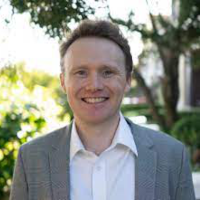Bochum-Grenoble Memory Colloquium
2023-2024


Rebecca Copenhaver
(Washington University at Saint Louis)
Toward a moderate simulationism
16:15-17:45 CEST (UTC+02:00), 12 October 2023
Abstract: Simulationism is the claim that remembering is imagining an event in one’s personal past. This claim is ambiguous. In some instances, the claim is that the constructive episodic simulation system is composed of systems distinguishable by function but sharing a common source of stored information and having similar neural and cognitive underpinnings. On this reading, episodic remembering remains a possible natural kind and a proper object of the psychological and cognitive neurosciences. Yet in other instances, the claim is that there is a properly functioning, reliable system that aims at constructing episodic representations, full stop. On this reading, episodic remembering is not a natural kind, it is not a proper object of the psychological and cognitive neurosciences, and it ought to be eliminated in favor of the notion of constructive imagination as the most properly basic natural kind to be studied. Simulationist have been moving towards the second, eliminativist option. I argue that their reasons for having done so are inconsistent with simulationism as a naturalist project. And I argue that there are good methodological reasons to continue to treat episodic remembering as a possible natural kind and a proper object of the psychological and cognitive neurosciences at this stage in the process of discovery.

Marta Caravà
(Purdue University)
How social norms mess up our memories
16:15-17:45 CET (UTC+01:00), 2 November 2023
Abstract: Social norms have a huge influence on our behaviors, choices, thoughts, and beliefs. For example, these unwritten rules and expectations direct our gaze towards our interlocutors’ faces, shape how we think about our bodies, drive our career and romantic choices, and guide us in forming and updating our political and religious beliefs. Their influence on our everyday lives is pervasive. In this talk, I investigate an important but underexplored way in which social norms shape our mental lives: their influence on memory. In particular, I aim to explain three real-life cases in which our memory fails: forgetting another person’s idea, attributing another person’s idea to oneself during memory recall –i.e., misremembering–, and failing to recognize a memory of another person’s idea as a memory. I have two main claims. First claim: if the project is to explain these memory failures in real life, appealing to cognitive explanations in the philosophy and cognitive science of memory is not sufficient. These explanations are valuable at a general level. Still, they do not tell us why and how one forgets or misremembers particular memories, or fails to recognize them as memories. Since particulars are what we care about when we undergo or are at the receiving end of memory failures in real life, a good explanation should account for this dynamic. Second claim: appealing to the social elements of these cases is the right way to go. In particular, I claim that social norms and the psychological machinery they recruit explain why, in specific but common real-life cases, one forgets or misremembers some particular memories –but not others–, or fails to recognize these memories –but not others– for what they are. To argue for this claim, for each of my cases I formulate hypotheses about how the psychological machinery of social norms influences memory retrieval, thus causing, at least in part, the memory failures in question. This socio-normative explanation is not at odds with extant explanations of memory failures in philosophy and cognitive science. Still, it is an example of how, depending on the projects we want to undertake, we might need to adapt and revise these explanations in order to achieve different philosophical goals.

Louis Renoult
(University of East Anglia)
Knowing what we remember: The striking overlap between semantic and episodic memory
16:15-17:45 CET (UTC+01:00), 9 November 2023
Abstract: Although textbook descriptions suggest that semantic and episodic memory are associated with clearly distinct content and subjective experience, different patterns of impairment in neuropsychological patient studies, and distinct brain activations in neuroimaging studies, data collected in recent years suggest a more complex pattern. At the behavioural level, few existing memory tests allow well-matched comparisons between semantic and episodic memory performance. Moreover, most tests of naturalistic human memory require participants to recall episodic memories, and interpretation of retrieved semantic details often poses difficulties. I will discuss newly developed memory measures that circumvent some of these issues, including a new version of the autobiographical interview. I will also mention studies of patients with adult-onset amnesia, using experimental designs and test items that provide good sensitivity to subtle impairment, that demonstrate parallel impairment of semantic and episodic memory. Finally, recent neuroimaging evidence suggests that the neural correlates of semantic and episodic memory retrieval demonstrate remarkable overlap. Two possible explanations for this overlap will be discussed. First that activity of some, or possibly all, regions belonging to the episodic recollection network may support the reinstatement of semantic processes engaged as an episode was first experienced. Second, that semantic and episodic memory rely on different weightings of some of the same elementary processes, such as sensory-perceptual imagery, spatial and temporal features, and self-reflection.

Daniel Gregory
(University of Barcelona)
A theory of memory for the law
16:15-17:45 CET (UTC+01:00), 23 November 2023
Abstract: Several of the phenomena which philosophers discuss are also extremely important in the practical operation of the law: responsibility, causation, intention, and many others. Moreover, legal decision-makers, such as judges, often have to grapple with the same kinds of puzzles about these phenomena as philosophers do. A major difference, however, is that the discussions of legal decision-makers typically take place in a context where there is a need for finality. Some notion of responsibility, causation, intention, or whatever else needs to be settled on so that a decision can be made. So, while the discussions can be highly insightful, they cannot always proceed to the same level of detail and refinement as philosophical or other extra-curial discussions. Memory is also important for legal purposes. It is relevant to the reliability of witness testimony, to questions about mens rea, to certain issues in copyright law, and to the legal competence of testators, among many other legal issues. This has been discussed in a range of fields, but it has not received a great deal of attention in the philosophy of memory. Building on existing work across various disciplines, and focusing on both real and fictional case studies, I continue the search for a notion of memory adequate for the law.

Julian Bacharach
(University of Antwerp)
A minimalist approach to memory causality
16:15-17:45 CET (UTC+01:00), 7 December 2023
Abstract: Our common sense conception of memory involves the idea that when you recall an event from your past, you can do so only because you previously witnessed that event, or were involved in it as an agent or participant. It is all but irresistible to account for this dependence in causal terms: your recollection is explained causally by your earlier experience of the event of which it is a recollection. However, the idea that memory always involves a causal connection to the past has come under attack in recent philosophical work. A ‘simulationist’ view of memory holds that there is no important difference between remembering the past and imagining future or counterfactual scenarios, and that a successful and genuine recollection of a past occurrence need not causally originate in an experience of that occurrence. The principal motivation for this view is the rejection, based on findings in the cognitive neuroscience of memory, of the idea of a ‘memory trace’ that faithfully preserves the content of the original experience and is retrieved in recall. In this paper I argue against throwing the causal baby out with the bathwater. The discovery that there is no such thing as a memory trace should not lead us to conclude that the ordinary causal conception of memory is ill-grounded. The need to posit memory traces arises principally from the ambition to give nontrivial necessary and sufficient conditions that must be added to a neutral notion of ‘representing an event’ to make it a genuine memory. Yet there are grounds for scepticism about the viability of this analytic project that are not themselves grounds for doubting the causal character of remembering. A minimalist approach to memory causality recognises this basic causal character while rejecting the demand for a reductive account of what the causal mechanism consists in. I address the potential objections that the minimalist approach involves some kind of spooky temporal action-at-a-distance, and that it fails to give an adequate explanation of the singularity of episodic recall.

Simon Høffding
(University of Southern Denmark)
Phenomenological interviews and the problem of our fallible episodic memory
16:15-17:45 CET (UTC+01:00), 21 December 2023
Abstract: In this talk, I argue that qualitative research in general, and phenomenological interviews in particular, are no less reliable than other strands of empirical research. Qualitative interviews constitutively rely on the episodic memory of both researchers and informant. Indeed, all its data is generated through this cognitive function. Though episodic memory is notoriously unreliable, qualitative researchers usually proceed unperturbed to develop theory and discuss their results deriving from this source. In order to understand and defend my argument, I first provide some reflections on what qualitative research is. In particular, I focus on the constitution of experience from the perspective of phenomenology and draw out some ontological, epistemological, and methodological consequences. I then look at specific traditions within qualitative research, such as Petitmengin’s “Micro phenomenology” and Kvale & Brinkmann’s “Interviews” and criticize their reflections on reliability for failing to directly tackle problem of memory. To conclude, I suggest that, for the purposes of qualitative research methods, a phenomenological-hermeneutic conception of experience, coupled with a healthy dose of humility in one’s own methods and results, is the best response to the problem of our fallible episodic memory.

Jan Christoph Bublitz
(University of Hamburg)
The ethics of individual memory: Structuring the field and wondering about its relevance
16:15-17:45 CET (UTC+01:00), 11 January 2024
Abstract: Although several ethics questions relate to individual memory, a distinct field of an ethics of a memory has not yet emerged. And while certain questions have received sustained analysis, the duty to bear witness and preserve painful memories as the perhaps most prominently example, there are hardly any attempts to structure the questions and analyse them in a systematic way. Several reasons might explain this absence. Memory might be seen as largely uncontrollable - but this does not do justice to the manifold though subtle ways to affect memories. Or it might be seen as a part of a broader ethics of the mind - but this may fail to do justice to the relevance of memory and its peculiar features. This talk thus proposes a taxonomy for an ethics of memory consisting of four orders and three modalities, identifies key case examples for each category, and invites the audiences to wonder whether developing such a system has any purchase on addressing specific ethical questions.

Johannes Mahr
(York University)
Is there an language of episodic thought?
16:15-17:45 CET (UTC+01:00), 25 January 2024
Abstract: Episodic memory and imagination (or, in my terms, ‘episodic thought’) are most commonly thought of as prime examples of capacities that don’t have propositional contents. Consequently, episodic thought has not been seriously analyzed from the perspective of cognition as relying on a ‘language of thought’. Here, I will propose that the fact that episodic representations seem to have at least partly imagistic contents is compatible with the idea that they display central features of sententiality. On this view, episodic retrieval consists of two separate types of processes, each of which have both a compositional semantics and a combinatorial syntax. On the one hand, the construction of event content relies on the composition of discrete representational primitives inherited from perception and semantic knowledge. Such construction can be guided by a memorial index pointing to a compositional representation encoded during experience and/or by knowledge structures like event and scene syntaxes. On the other hand, event content can be predicated so as to play various cognitive roles (e.g., as an imagination of a future event or a memory of a general routine). These predicates are discrete and abstract but compose according to syntactic rules determining the well-formedness of the episodic thought as a whole. Beyond being an integrative computational-level theory of episodic retrieval, my proposed view has various philosophical upshots. Most prominently, while holding that episodic thought is a natural kind, it is compatible with some versions of process discontinuism and all versions of attitudinal discontinuism between memory and imagination.